NewsletterTemplate
BP SPECIES
NEWSLETTER June 2002
July
00 Aug
Sept
Oct
Nov
Dec
Jan01
Feb
Mar
April
May
June
July
Aug
Sept
Oct
Nov
Dec
Jan02
Feb
March
April
May
WHATS NEW ?
IMPORTANT
NOTE for USA importers. Phytos & Permits
In FLASK.
Phaius tankarvilleae, Oncidium zappii (Photo right), Laelia purpurata Sanguineum
'Mentzi'. 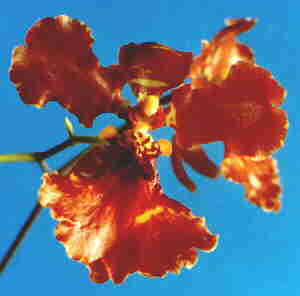
In PLANTS.
Neofinetia falcata "Amami Island Giant", Cattleya
blossfeldziana, Cattleya intermedia alba dutra, Rhyncostylis gigantea "Jungle
Red x Red"
Ready
to replate. Eulophia
decaryana, Cochleanthes amazonica, Cheirostylis cochinchinense
Culture.
Orchids of the Townsville Region.
Did you
know? IMPORTANT NOTE
USA importers, Phytosanitary Certificates, Import Permits. .
Web Site.
www.speciesorchids.com New Links plus more photographs up.
Orchid Auction.
Plants, Flasks, Books.
Flasking
supplies, medias,
nonabsorb cotton wool. Notes on
flasking.
Spare Flasks
on hand. Some species that
can be shipped NOW.
Humour.
Wanted.
Some species wanted.
Subscribe,
Unsubscribe.
Request. click here for Flask
List Plant
List New
Germinations
Photos in this issue. Oncidium
zappii (courtesy Brian Blackley) above, Townsville
scenic views, Nervilia holochila, Cymbidium canaliculatum,
Habenaria triplonema.
Items in this Newsletter may be reproduced
provided source acknowledged. Do you know any orchid growers who may like
to receive this newsletter? Why not forward this email to them now!
A b&w printed copy of this Newsletter can be
mailed each month if you send 12 Australian stamps or 12 International
reply coupons to Burleigh Park Orchid Nursery, 54 Hammond Way, Thuringowa,
Australia 4815.
We commend "Orchids Online
Web Design" for the excellent work on our web site.
For information or prices
click
here or email Steve at steve@orchidsonline.com........
Steve is looking for Orchid
Society and Orchid Nursery Information to include on his site.
If you can help, why not
visit his website at http://www.orchidsonline.com.au
and fill in
the online form now
New
in Flask.
Phaius tankarvilleae. A terrestrial species, fast
growing, that needs a rich leafmould and soil media. Intermediate to warm
conditions, somewhat drier in winter. The soft leaves should be protected
from excess sunlight and wind.
Oncidium zappii. This is a large flowered crispum
type species from Brazil. A treefern mount is perhaps the best growing
media if available. A rest in winter is needed, and intermediate conditions
apply.
Laelia purpurata Sanguinea 'Mentzi'. A large
growing cattleya like plant with large flowers to 15 cm ( 6 inches).
Growing conditions as for cattleya, well drained media, good ventilation
and sunlight. This form is a dark red purple, with the labellum somewhat
darker in colour.
Top
New
in Plants.
Seedlings raised in the Nursery are growing in 50mm
pots in a mix of spaghnam and shredded isolite. The following species are
establishing well, ready to ship.
Neofinetia falcata "Amami Island Giant". From the
Japanese island of Amami, which is almost tropical in climate, this larger
growing form has waxy fragrant white flowers with a long spur. Best grown
in a small pot or basket, in nature they are lithophytic and grow in almost
full sunlight. Intermediate grower.
Cattleya blossfeldziana, from Peru, was initially
considered a natural cross between Cattleya rex and Cattleya
luteola. A typical intermediat growing cattleya, with the same requirements
fo a well drained media, maximum ventilation and sunlight.
Flowers yellow with red purple in the labellum.
Cattleya intermedia alba dutra, a Brazilian species,
has pure white waxy flowers to 12.5 cm ( 5 inches) across. The flowers
are heavy textured, last well and are beloved by florists.
Rhyncostylis gigantea " Jungle red x red'. A sib
cross between an original red form and a more modern line bred red. The
two red colourations are noticeably different, with well shaped waxy, fragrant
flowers. Best grown in a small basket, medium shade and warm to intermediate
conditions with a drier winter.
Top
Ready
to Replate.
Eulophia decaryana.This Madagascan species is a
semiterrestrial, intermediate grower, with hard glossy leaves and bulbs.Best
grown in a rich leafmould media in a large shallow pot. It has a definte
dormant period during the colder months.
The flower spike is erect, branched and many
flowered, with yellow and green and red marked flowers.
The leaves are attractively flecked along
the edges with pale green white.
Cochleanthes amazonica, an
intermediate to cool grower, is noteworthy for its large white labellum
striped red. A fan like plant, it requires a medium that will stay damp
but not wet, a shady sheltered spot and either a small pot or basket. It
grows readily from flask and is a spectacular species in flower.
Cheirostylis cochinchinense
is one of the Jewel orchids from Vietnam. The glossy green leaves have
a central pale cream white feathering along the midrib. A semiterrestrial
or lithophytic grower, it requires a moist media, good drainage, heavy
shade and a definite drier rest in winter. This has been slow growing in
flask, but plants are now quite large and ready for the final replate.
More photos at www.speciesorchids.com/photos.html
Top
Culture.
Townsville, North Queensland
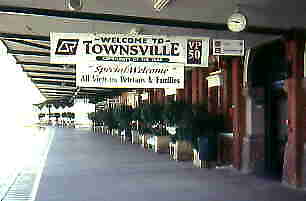 Townsville is one of a paired city with Thuringowa, sitting in the tropics.
Townsville is one of a paired city with Thuringowa, sitting in the tropics.
Many orchid species grow in the region as epiphytes, lithophytes
and terretsrials. Dominating Townsville citys skyline is Castle Hill, where
two species inhabit the rock faces. Castle Hill is photographed with the
city surrounding it.
The type material of Sarcochilus cecileae was collected
from here, where it grows in the crevices, in almost full sun, along with
plants of Dendrobium discolor.
The other distinctive landmark is Mount Stuart,
photographed at dusk, below. This mountain is twice the height of Castle
Hill and is a wetter environment. On top grow the terrestrials Habenaria
triplonema, Nervilia discolor, Pterostylis ophioglossa var Collina, Corybas
fimbriata, and until the ground was cleared for a transmitter tower,
Diurus punctata alba. A species of Eulophia has been reported,
but not found in flower.
In the scrubby creek trees Sarcochilus tricalliatus
swarms, along with Dendrobium discolor, Dendrobium mortii and Oberonia
muelleriana. An ironbark tree is host to a very occasional Cymbidium
canaliculatum.
On the lower slopes of Mount Stuart, Geodorum pictum
and Nervilia holochila have been found.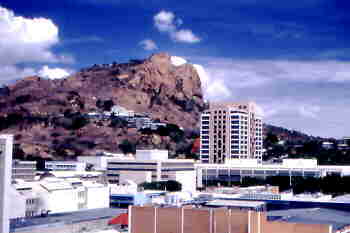 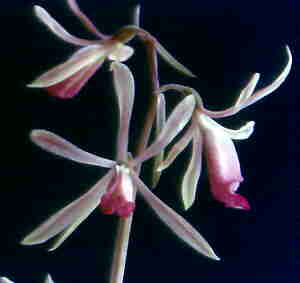 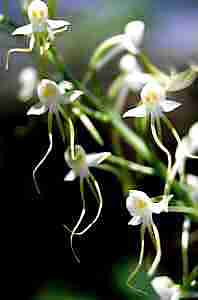
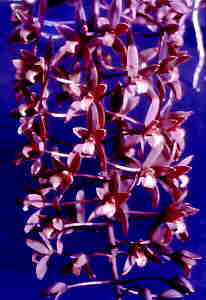
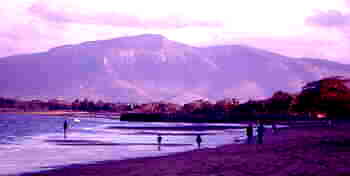
Photographs show Railway Station, Castle Hill centre of city,
the almost laelia like flowers of the terrestrial Nervilia holochila,
a close up of the green white Habenaria plumes of H.triplonema
and Cymbidium canaliculatum which is an inhabitant of the drier
inland, but because Townsville is in a rain shadow, the species is occasionally
found. Mount Stuart at dusk.( Thanks to Ziggy for the Townsville scenic
views.) More photos at www.speciesorchids.com/photos.html
Top
Did
you know ?
IMPORTANT NOTE for USA importers.
USDA has, from January 2002, begun to enforce the requirement for
a Phytosanitary Certificate for all plant and plant material imports.
This is not a new regulation, but the implementation of a rule that has
previously not been enforced.
ALL FLASKS imported into USA will now require a Phytosanitary
Certificate.
Burleigh Park does provide this Phytosanitary Certificate at cost.
Flasks are still CITES exempt.
USA growers can obtain an Import Permit and green/yellow
stickers which expedites the delivery of parcels of flasks,
plants etc. Contact and enquire for the nearest Inspection Unit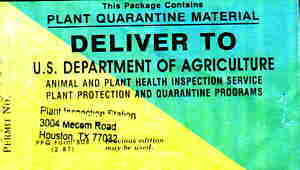 U.S. Department of Agriculture, APHIS
Plant Protection and Quarantine Permit Unit
4700 River Road, Unit 136
Riverdale, Maryland 20737-1236
The Import Permit application is PPQ Form 587
Heightened enforcement of
existing regulations
affects orchid flask imports
An external audit of enforcement procedures by USDA/APHIS (US Department
of Agriculture/Animal and Plant Health Inspection Service) has resulted
in the edict that orchid plants in flask also require phytosanitary certification.
I inquired about the background on this and got the following reply from
Bud Petit de Mange of USDA:
"The way the regulation 319.37 is written, a phytosanitary certificate
is required for all restricted articles. By the definition, seedlings and
plantlets in flasks are restricted articles and, therefore, phytosanitary
certificates are an import requirement for them. A regulation change is
needed in order to exempt a restricted article from phytosanitary certification.
A little more than two weeks ago, I made a request to our agency's Import
and Interstate Services branch and asked that they propose such a change.
They are currently developing a work plan for a proposed revision to 319.37
and stated that they will include a proposal to exempt from phytosanitary
certification plant materials of generally admissible species if they are
imported on agar and/or liquid media within sterile containers (=flasks).
In that same proposal, they will propose changes regarding the current
requirement for translucent, transparent media. Unfortunately, making changes
to Federal regulations is a long, time-consuming process. Many take one
and one-half years, or more, from the time they are first proposed until
they published as Final Rules, which officially incorporates the change
into the regulation.
Bud Petit de Mange
CITES and Plant Inspection Station Coordinator
Port Operations "
In other words, sterile flasks of orchid seedlings or meristems
now require a phytosanitary certificate from the country of origin. Unfortunately,
because this enforcement change was the result of an external audit, no
leeway exists as with the recent opaque media imbroglio. However, as
these two regulation changes march through the process,
both will require your encouragement. We suggest you write to:
Dr. Richard L. Dunkle
USDA, APHIS, PPQ
Jamie Whitten Building
14th and Independence Ave., S.W.
Room 301-E
Washington, DC 20250
(Thanks to Nick for onforwarding the above.)
Phytosanitary Certificate requirements for all countries.
We are preparing a data base for the import requirements for Phytosanitary
Certificates for as many countries as possible.
If you have permits or other information, please contact us so
that we can include as many countries as possible. A snailmail photo copy
would be ideal.
The data base will list the various requirements to import flasks
and orchid plants into each country and any special requirements pertaining
to Phytosanitary Certificates.
We all dislike red tape, but the Certificates and Permits
mean disease and pest free imports and quicker delivery to you.
Do you set seed pods on your
treasured species orchids? The best conservation, sow seed.
Top
Web
site.
More Photographs Up
Check out our web
page www.speciesorchids.com
Year
2000 winner of "Linda the Orchid Lady" award .
EMAIL address
Top
Auction.
ORCHID AUCTION ACTION
Have a look at this busy Orchid Auction site.
PLANTS BOOKS FLASKS
Sell those spare plants ! Find that elusive
rare plant or book !
Orchid
Auction Site
Top
Flask
supplies.
Flasking medias; click
on here and go to Supplies page
www.speciesorchids.com
For working Nursery Medias for Mother and Replate Flasks.
A special note on flasking
orchids.
Due to the need for a filtered air vent on flasks to allow
exchange of gasses, a reliable air filter medium is needed.
Non absorbant cotton wool allows gas exchange but does not
absorb moisture. Thus the air filter will stay dry and prevent the growth
of fungus thru the filter, a common problem with ordinary cotton wool which
gets wet, goes mouldy and allows the mould to grow thru the filter to contaminate
the flask.
Non Absorbant Cottonwool NOW AVAILABLE in
375 gram rolls,
click contact
us NOW.
Top
Spare
Flasks on hand.
There are sometimes spare flasks available. These are ready
to ship, but we do not recommend shipping these flasks in your winter
as they are ready to deflask now.
For a list of available flasks, email
or click
here
Wanted.
If anyone knows where to get any of the following, please advise;
Aerangis platyphylla aka Angraecum potamophilum
Den. harveyanium Den. falconeri plants
Dendrobium Wardii (plant)Dendrobium Harveyanum (plant)
Dockrillia fuliginosa Dendrobium buloculare Den. pseudoglomeratum
Den. chalmersii Den. chrysoglossum
Top
Humour.
U.S. Department of Agriculture, APHIS
Plant Protection and Quarantine Permit Unit
4700 River Road, Unit 136
Riverdale, Maryland 20737-1236
The Import Permit application is PPQ Form 587
Heightened enforcement of
existing regulations
affects orchid flask imports
An external audit of enforcement procedures by USDA/APHIS (US Department
of Agriculture/Animal and Plant Health Inspection Service) has resulted
in the edict that orchid plants in flask also require phytosanitary certification.
I inquired about the background on this and got the following reply from
Bud Petit de Mange of USDA:
"The way the regulation 319.37 is written, a phytosanitary certificate
is required for all restricted articles. By the definition, seedlings and
plantlets in flasks are restricted articles and, therefore, phytosanitary
certificates are an import requirement for them. A regulation change is
needed in order to exempt a restricted article from phytosanitary certification.
A little more than two weeks ago, I made a request to our agency's Import
and Interstate Services branch and asked that they propose such a change.
They are currently developing a work plan for a proposed revision to 319.37
and stated that they will include a proposal to exempt from phytosanitary
certification plant materials of generally admissible species if they are
imported on agar and/or liquid media within sterile containers (=flasks).
In that same proposal, they will propose changes regarding the current
requirement for translucent, transparent media. Unfortunately, making changes
to Federal regulations is a long, time-consuming process. Many take one
and one-half years, or more, from the time they are first proposed until
they published as Final Rules, which officially incorporates the change
into the regulation.
Bud Petit de Mange
CITES and Plant Inspection Station Coordinator
Port Operations "
In other words, sterile flasks of orchid seedlings or meristems
now require a phytosanitary certificate from the country of origin. Unfortunately,
because this enforcement change was the result of an external audit, no
leeway exists as with the recent opaque media imbroglio. However, as
these two regulation changes march through the process,
both will require your encouragement. We suggest you write to:
Dr. Richard L. Dunkle
USDA, APHIS, PPQ
Jamie Whitten Building
14th and Independence Ave., S.W.
Room 301-E
Washington, DC 20250
(Thanks to Nick for onforwarding the above.)
Phytosanitary Certificate requirements for all countries.
We are preparing a data base for the import requirements for Phytosanitary
Certificates for as many countries as possible.
If you have permits or other information, please contact us so
that we can include as many countries as possible. A snailmail photo copy
would be ideal.
The data base will list the various requirements to import flasks
and orchid plants into each country and any special requirements pertaining
to Phytosanitary Certificates.
We all dislike red tape, but the Certificates and Permits
mean disease and pest free imports and quicker delivery to you.
Do you set seed pods on your
treasured species orchids? The best conservation, sow seed.
Top
Web
site.
More Photographs Up
Check out our web
page www.speciesorchids.com
Year
2000 winner of "Linda the Orchid Lady" award .
EMAIL address
Top
Auction.
ORCHID AUCTION ACTION
Have a look at this busy Orchid Auction site.
PLANTS BOOKS FLASKS
Sell those spare plants ! Find that elusive
rare plant or book !
Orchid
Auction Site
Top
Flask
supplies.
Flasking medias; click
on here and go to Supplies page
www.speciesorchids.com
For working Nursery Medias for Mother and Replate Flasks.
A special note on flasking
orchids.
Due to the need for a filtered air vent on flasks to allow
exchange of gasses, a reliable air filter medium is needed.
Non absorbant cotton wool allows gas exchange but does not
absorb moisture. Thus the air filter will stay dry and prevent the growth
of fungus thru the filter, a common problem with ordinary cotton wool which
gets wet, goes mouldy and allows the mould to grow thru the filter to contaminate
the flask.
Non Absorbant Cottonwool NOW AVAILABLE in
375 gram rolls,
click contact
us NOW.
Top
Spare
Flasks on hand.
There are sometimes spare flasks available. These are ready
to ship, but we do not recommend shipping these flasks in your winter
as they are ready to deflask now.
For a list of available flasks, email
or click
here
Wanted.
If anyone knows where to get any of the following, please advise;
Aerangis platyphylla aka Angraecum potamophilum
Den. harveyanium Den. falconeri plants
Dendrobium Wardii (plant)Dendrobium Harveyanum (plant)
Dockrillia fuliginosa Dendrobium buloculare Den. pseudoglomeratum
Den. chalmersii Den. chrysoglossum
Top
Humour.
Wife to husband after they won the Lottery, " What do I do with
all the begging letters, dear?
Husband; " Keep sending them!"
Pick Up;
It's a dark and stormy night and in your 2 seater sports car
you pull up at a bus stop to find an old and faithful friend, an old lady
that needs to go to hospital urgently and a stunning person who could be
the light of your life, your lifes soul mate.
Who do you give a lift to, with just room for one
person?? ( answer at bottom of page).
Warning labels
On baby stroller "Remove baby before folding"
In public toilet "Recycled flush water unsafe for drinking"
On carpenters electric router "This product not intended for use as
a dental drill"
On laser printer cartridge "Do not eat toner"
On prescription sleeping pills "Warning. May cause drowsiness"
On box containg clothes iron "Never iron clothes while they are being
worn"
On wheelbarrow "Not intended for highway use"
On windscreen sun cover "Do not drive with sun shield in place"
On hair dryer "Never use hair dryer while sleeping"
Top
Subscribe.
To have your name added
or removed from the mailing list, email click
here
"Unsubscribe me please!" orclick
here
Ian and Pat Walters,
Burleigh Park Orchid Nursery
54 Hammond Way, Thuringowa,
Australia 4815
Email us at www.speciesorchids.com
Phone Fax 0747 740 008
International 61 747 740 008
Answer to PickUp; You give the car keys to your friend to transport
the old lady to hospital while you wait for a bus with the light
of your life, your possible lifes soul mate. Good luck.
For Web Design and Web Hosting
Contact Orchids Online Web Design
Designed by Orchids
Online Web Design © All rights reserved.
|

 Townsville is one of a paired city with Thuringowa, sitting in the tropics.
Townsville is one of a paired city with Thuringowa, sitting in the tropics.






